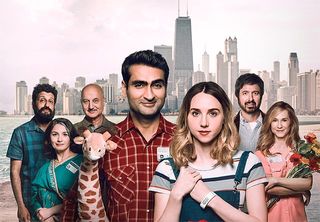Laughter
The Big-hearted "Big Sick"
Real emotions in a romantic comedy are a real way to your heart.
Posted July 24, 2017

It’s rare when a film isn’t about guns or apes or princesses. It’s even rarer when a film is about timely cultural issues and doesn’t shove its message down your throat, but makes you laugh...and empathize...and think about things. That’s one of the beauties of The Big Sick, a Judd Apatow romantic comedy that goes far beyond its genre and genuinely touches the heart. And its release at this point in our ongoing American drama is so relevant.
The romantic leading man is a Pakistani-born Muslim, Kumail Nanjiani, who wrote the screenplay with his wife, Emily V. Gordon, based on their own story of how they got together (they have now been married for ten years). You may recognize Kumail from his role on the TV show Silicon Valley. In the movie, he is also named Kumail, and Zoe Kazan stars as his love interest.
Kumail is deeply attached to his family—his mother, father, and brother—but is definitely not an observant Muslim. He pretends to pray, and although he has no intention of actually going through with an arranged marriage, as his brother did, he continues to pacify his mother by meeting all the eligible Pakistani prospects she has “drop by” during the dinner hour. Instead, he uses his heritage to pick up women in bars by writing their name in Urdu; definitely an original pickup line!
And then he meets a woman he really likes—Emily, a family therapist—who gently heckles him as he’s doing his standup routine. He keeps their budding relationship secret from his family, and he keeps his family’s insistence on an arranged marriage secret from Emily. As the author of a book called Truth Heals, I understand all too well the cost of keeping big secrets. Here Kumail is faced with a difficult choice: losing his family (they will stop acknowledging his existence if he dates a non-Pakistani woman) or losing Emily, which ultimately happens when she realizes he’s not willing to go against the family.
I’m not giving away anything when I tell you that Emily goes into the “big sick” of the title. Soon after she and Kumail break up, she winds up in intensive care for a mysterious infection and is put into a medically-induced coma. Informed by a friend, Kumail arrives at the hospital, where he soon meets Emily’s parents—played by Holly Hunter and Ray Romano—who know he’s the one who broke Emily’s heart. I know a coma doesn’t sound funny, but there’s such a light touch to everything, and we feel Kumail’s deep caring for Emily and his discomfort with her parents. It’s romance with real emotions, and tears mingle with the laughter.
Even the Muslim-baiting is handled deftly. When a frat-boy heckler says, “Go back to Isis” during Kumail’s comedy set, we see and feel exactly what so many Muslims (and other minorities) in America are experiencing. But Kumail, in a deadpan delivery, comes back with: “I am a terrorist. I just do standup comedy on the side, to keep a low profile.” A poignant lesson on disarming ignorance and hatred.
So in one film, we find ourselves enmeshed in the meaning of family, the assimilation of other cultures to America, and what it means to pursue your dreams despite the conflicts it causes in your family and love relationships. And we see how a difficult situation, in this case Emily’s coma, brings about transformation—Kumail’s personal growth and the changing attitudes of the parents.
The fact that Kumail is a Muslim from Pakistan, and everyone watching the film can connect to his struggles, is such an important message about racism, without ever seeming like it.
Sitting in a darkened movie theater, you don’t know the folks in the rows around you, their religion, their country of origin. All you can feel are the shared moments of laughter, and see their contented smiles as they exit the theater. You’ve just had an experience of unity—the shared consciousness of laughing at the same jokes, squirming at the same meet-the-parents discomfort, and embracing relationships that mix brown and white, Muslim and Christian, man and woman, parent and child, the good and the bad. Life itself, in two hours. But it will stay with you for much much longer than the length of the movie.


